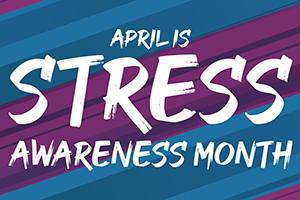
Stress Awareness Month
Stress. Even the mention of the word can cause…well, stress! What is it and why is it such a topic in modern living? Charles F. Glassman, renowned doctor and author of The Brain Drain wrote, “Stress can destroy much more than just our physical health. Too often, it eats away at our hope, belief, and faith.”
The World Health Organization (WHO) defines stress as “any type of change that causes physical, emotional or psychological strain.” Simply put, stress is how our body responds to anything that demands attention or action.
With April being Stress Awareness Month, we thought it would be appropriate to discuss stress and in particular, its relation to the grief process. The reality is we all experience stress in some form or fashion. And sometimes it’s a good thing. Let’s say you’re at a crosswalk and the light turns green signaling that you may cross the street. You take a couple of steps and suddenly, a car comes speeding by. Your heart races, you feel a rush of adrenaline, and you quickly hightail back to the curb to avoid being struck. That’s a case of stress working for you.
Then there is the not-so-good stress. This is when things get so overwhelming that you find it difficult to sleep or concentrate. You feel irritated, angry, anxious, sad, depressed, or just burned out. So many things can contribute to our stress: financial issues, illness, relationship problems, and even the loss of a loved one.
In an article titled The Physical Stress of Grieving, author Elizabeth Harper Neeld, Ph. D states that our bodies will experience physical changes similar to what we would experience in a life-threatening situation. She writes: “Emergency-mobilizing chemicals are released. As our stress increases, the chemical levels increase; and our central nervous system becomes highly stimulated.”
These chemical changes within us impact our ability to think clearly, as well as how we digest food, sleep, and even breathe. This is all compounded by the emotions we are dealing with over the loss of a loved one. How we respond to the increased stress we are feeling will help determine how well we can handle it. Stress management is vital during these trying times. Dr. Neeld suggests trying the following steps daily to help deal with the physical effects of stress during grief:
- Take enough time off from work
- Eat healthy meals
- Drink plenty of water
- Rest and relax
- Exercise—take a walk, ride a bike, swim, etc.
- Get a massage
- Listen to music
- Simplify your schedule
- Cut out activities that take up time and energy you don’t now have
- Pray and meditate
- Talk to a professional counselor
- Get a physical check-up within five months of your loss
While none of us can have a completely stress-free life, we all can explore ways to respond to it, especially while we are grieving. The Centers for Disease Control and Prevention (CDC) offers more tips on how to build resilience. Visit their website at https://www.who.int/news-room/questions-and-answers/item/stress and learn about other ways you can help manage your stress. It can have a significant impact on our overall well-being.
